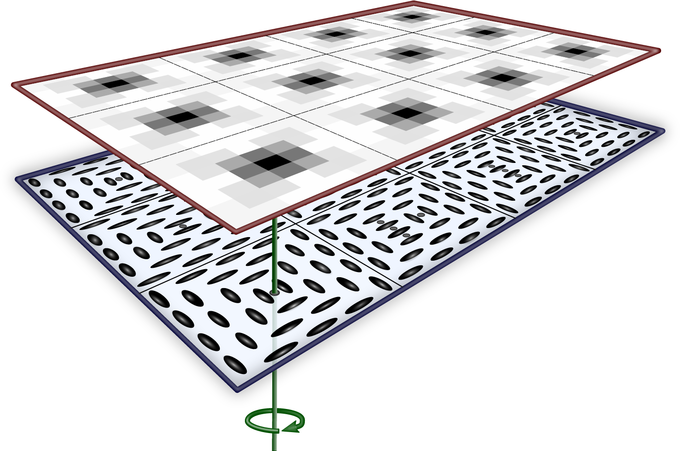EU funding for top-level research
ERC Starting Grants: Three successfull physics projects
2019-09-04 – News from the Physics Department

Every year, the European Research Council awards its acclaimed ERC Grants to fund cutting-edge research projects in a variety of categories. Starting Grants are reserved for scientists who are in the early years of their careers. The value of each grant can be as high as EUR 1.5 million.
Dr. Felix Deschler
Hybrid perovskites are semiconductors that comprise organic and inorganic components. They have the potential to be used as highly efficient materials – for example, for solar cells and LEDs of the future – as they can convert light into power very effectively, are easy to manufacture and also extremely defect tolerant. Dr. Deschler aims to develop new hybrid perovskite materials with a dual function in his TWIST project. The materials should, on the one hand, be high-intensity semiconductors with easily controllable properties. On the other hand, it should also be possible to have a targeted influence on the spin of the charge carriers. Effective semiconductors demonstrating both properties have not been developed to date. The perovskites Dr. Deschler hopes to develop could, for example, be used to manufacture LEDs that emit circularly polarized light. These could be deployed in anti-reflection and highly efficient displays and spintronics components.
Dr. Felix Deschler leads an Emmy Noether research group at TUM’s Walter Schottky Institute.
Prof. Michael Knap
Some of today’s conventional processors are reaching the limits of what they can achieve. Quantum computers are seen as a promising alternative as they can deal more effectively with many different problems – in theory, at least. In reality, many of the basic principles of the quantum materials to be used in these computers are still shrouded in mystery. Prof. Knap is investigating the properties of these systems in his CosQuanDyn project. His research focuses on constrained quantum systems that are far from their thermal equilibrium. The constraint for quantum particles in these systems is that they can only take up certain configurations, with others being “forbidden”. New materials with these properties could be used in future to practically realize qubits, the computing modules of quantum computers. Prof. Knap aims to study these systems at theoretical level and thereby lay the foundations for future experiments.
Prof. Michael Knap is Professor of Collective Quantum Dynamics.
Prof. Susanne Mertens
Alongside the known active neutrinos which interact with other matter, sterile neutrinos could also potentially exist. They would be heavier than active neutrinos and their interaction with other particles would be much weaker. Prof. Mertens intends to search for these hypothetical particles as part of her SENSE project. Her most important tool is the KATRIN experiment, in which the decay of tritium causes electrons and neutrinos to be released – some of which could turn out to be sterile neutrinos. Proving the existence of sterile neutrinos could solve the mystery surrounding dark matter, which makes up one quarter of the universe. Sterile neutrinos are promising candidates for this dark matter.
As a researcher in the MaxPlanck@TUM program, Prof. Susanne Mertens is Professor of Dark Matter at TUM while also heading up a research group for experimental neutrino physics at the Max Planck Institute of Physics. As well as excellent research opportunities, the program gives outstanding young researchers clearly defined career prospects in TUM’s Tenure Track system.
More ERC grants at TUM
In addition to the three Starting Grants in physics, four more have been awarded in chemistry and medicine and three TUM projects have been singled out for Proof-of-Concept Grants. This form of funding is awarded to scientists who want to see if their ERC research projects can be turned into marketable innovations. As an entrepreneurial university, TUM places a strong emphasis on this aspect of research and provides targeted support for researchers’ and students’ start-up projects. These latest Starting Grants and Proof-of-Concept Grants bring the number of ERC Grants awarded to TUM scientists to 117.
Starting grants
- PD Dr. Jennifer Altomonte (Medizin)
- Prof. Dr. Job Boekhoven (Chemie)
- Dr. Barbara Lechner (Chemie)
- PD Dr. Veit Rothhammer (Medizin)
Proof-of-Concept Grants
- Prof. Dr. Daniel Cremers (Informatik)
- Prof. Dr. Dimitrios Karampinos (Medizin)
More information
Contact
- Dr. Felix DeschlerTechnical University of MunichAm Coulombwall 4, 85748 GarchingE-Mail: felix.deschler@tum.de
- Technical University of MunichJames-Franck Str. 1, 85748 GarchingTel.: +49 89 289 53777E-Mail: michael.knap@ph.tum.de
- Prof. Dr. Susanne MertensMax Planck Institute for Physics andTechnical University of MunichFöhringer Ring 680805 MünchenE-Mail: susanne.mertens@tum.deTel.: +49 89 32354 590